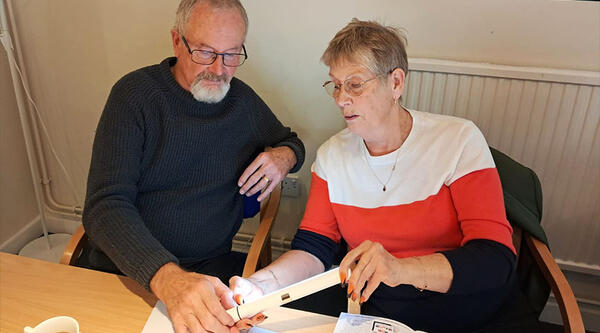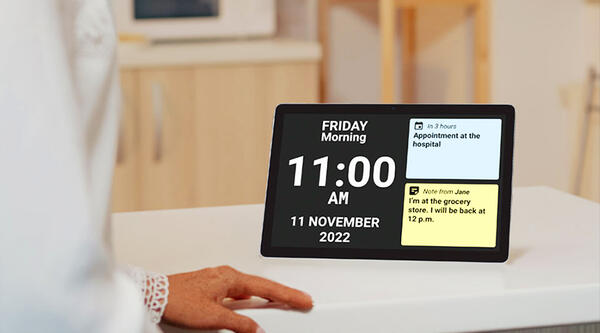Memory aids and tools
Read about aids that might help with different types of memory problems.
The memory handbook
- Understanding the different types of memory
- Staying healthy to help your memory
- Who can support with memory problems?
- You are here: Memory aids and tools
- Memory strategies
People with memory problems have suggested some of the following aids to help remember things. You might think of them as different tools for tackling different problems. You may have already used some of them.
Look for aids that fit with the skills you already have. For example, if you have never used a reminder function on your mobile phone, you may find it difficult to start using it now.
An occupational therapist can offer practical advice. For more expensive items, you might be able to ‘try before you buy’ – perhaps from an ‘assisted living’ shop on the high street or a disabled living centre. Contact your local authority for details of your nearest centre, or see the Disabled Living Foundation.
If you are not able to see a product before buying it, there might be online videos which show people using and reviewing the item. Whatever aids you use, people around you can support you to use them.
Common memory aids
Other useful memory aids
You can use sticky notes anywhere in your home to remind you to do a one-off task.
For example, you could:
- stick one on the freezer to remind you to take something out to defrost
- stick one on your bookshelf to remind you when you have to return a library book.
Once you have completed the task, it’s important to throw the sticky note away. This way you won’t accidentally remind yourself to do something you’ve already done. It also helps you to keep things tidy.
You can make more permanent signs, for example a laminated A4 sheet, to remind you of things you need to do regularly.
For example, you could:
- stick a sign to the inside of the front door to remind you to take your keys, purse, wallet or a shopping list with you
- have a sign by the sink reminding you to wash your hands before cooking
- keep a sign near the bin reminding you what day to leave it out for collection.
This is sometimes called a dosette box and has different compartments for each day and times of the day. The compartments have spaces for a number of different tablets. With a quick look, you can see whether you have taken your tablets for that day. Some models can be set to remind you when to take your pills, with an alarm, vibration or flashing light.
Your pharmacist can help you get a medication reminder box and put your tablets in the right compartments for you.
Try labelling or coding your keys so that each one is a different colour – you can buy coloured rubber key caps or rings for this. For example, your front door key could be red and your garage door could be green. If you live in a flat, the key to your building could be blue.
There are a range of electronic devices that can be used to help with memory problems. Some of these are also known as ‘assistive technology’. Many people find that electronic devices can help with daily tasks and support them to remain independent.
Some devices will be easy to use, while others may take longer to get used to. You may need the support of friends, family or professionals to help you choose one and get the most out of it. There are benefits to using electronic devices once you’re comfortable with them.
‘Smart’ devices like Amazon Echo, Google Home, and Apple HomePod can help you with memory problems. These are voice-activated devices that can answer questions or be set to notify you of tasks. For example, they can tell you the time and date if you ask, and can remind you when it is time to take medication.
These devices also have more advanced features, such as enabling you to add items to a shopping list or switching on the TV when a programme you want to watch is starting. You may need extra equipment for some of these tasks, and you also need to have wireless internet (Wi-Fi) in your home.
Use an alarm clock, a watch with an alarm, or a kitchen timer to remind you when you need to leave the house for an appointment, or when you have to check something cooking in the oven.
Write down why you have set the alarm, so you know why it is going off. Try to keep this reminder in a place that you’re likely to notice, such as a whiteboard, calendar or diary.
Mobile phones and smartphones both allow you to make calls and send texts. Smartphones generally have many more features, for instance being able to use email and ‘apps’.
There are different ways to use both types of device to help you:
- The display screen of most mobile and smartphones shows you what day and date it is. You can also use the calendar function to remind you of the day and date.
- You can set reminders on both types of device. This means an alarm goes off at a certain time with a message reminding you about something you need to do. This could be a one-off event like meeting a friend for lunch, or a regular reminder that a TV programme is starting, or to take medication. Some TVs or service providers also have reminder features, so you can set a reminder to watch or record a programme.
- When you have booked a doctor or dentist appointment, for example, they may be able to send a text or email reminder to you. Ask the receptionist about this when you book.
- Most devices have a built-in voice recorder. Use this to record information that you need to remember. You could play it back later, or transfer reminders to a written calendar at the same time each day.
- Most smartphones and many mobile phones have cameras. You could take a picture of something to remind you, instead of having to write anything down.
- Most smartphones have the same ‘virtual assistants’ that are used in the smart devices mentioned above. This means that you can ask them questions, arrange reminders, and use them in a very similar way.
- You can save a ‘favourites’ list when you shop online, making it easier to reorder each time.
If you have a tablet device (such as an iPad) you can use functions such as reminders, notes or the calendar to help you.
Most email accounts have calendar and to-do list features that you can check.
You might need to put a sticky note or label on your computer to remind you to turn it on and check your daily list.
These include:
- calendars
- reminders
- shopping lists.
If you have a smartphone or tablet device there are a range of applications (known as ‘apps’) that you might find useful. These include electronic versions of some of the memory aids mentioned above, as well as many others, such as:
- maps
- apps for life story work (a personal record of experiences, people and places in your life)
- apps for relaxation exercises and mindfulness – a technique that can help people manage their mental health or gain more enjoyment from life.
You can download apps from the internet (through a ‘store’ such as the App Store or Google Play) and use them for specific tasks. For example, you could use a medication reminder app to prompt you to take your pills, and which medicine to take. Some apps will be free, while you will need to pay for others.
There are lots of different apps available and you may want to try different ones to see if they work for you. Some apps have a free version which you can try before buying the full app.
These are devices that detect movement nearby and can be placed near a door. You can set the device to play a voice message as a prompt for your memory when you approach.
For example, it could go near your front door, to remind you to lock up when you go out, or to take your keys with you. Or you could have one near the kitchen door to remind you to check that you have switched the oven off.
Other kinds of reminder devices work in a similar way to smart devices and can automatically play a preset message at a certain time. For example, if you go shopping at 9.30 am on a Tuesday, you can record a message reminding you to take your shopping list and bags with you at this time.
You can use these to help you find frequently mislaid items such as keys or a wallet. You attach a small electronic tag to the item. If you mislay it, you click a button on the locator device to make the tag beep. You will need to keep the locator device somewhere obvious. Your friends and family may also find these useful.
Talk to friends and family about which aids you might use. Plan together how you’re going to use the aid and ask for their help. Focus on learning to use one aid at a time.
You can find some of the daily living aids featured in this section in the Alzheimer’s Society online shop.
Free Helpcards
Our free helpcards can make it easier to get help or assistance when you're out in the community.
- Page last reviewed:









Put a calendar, wallchart or noticeboard in a place where you will see it frequently – on the fridge or by the telephone, for example. You could use a whiteboard to note activities or tasks for the day, and wipe them off as you do them.
A notebook or large ‘week to view’ diary can be helpful. You can write down things you want to remember, such as lists of things you need to do, or have done. Keep it somewhere easy to see, such as by the telephone or in a fixed place in the kitchen.
Get into a routine of checking a diary, calendar, noticeboard or whiteboard – perhaps when you wake up in the morning, every mealtime, or every time you make a drink.
Cross the day’s date off your calendar before you go to bed, so that you are certain about the date when you get up the next day.
Write a few sentences or stick photos in a daily journal. You can look back in it to remind you what you have done or how you felt.
A journal may also give you something to show others or to talk about. You could collect mementos of things you’ve done to add to the journal as reminders. For example, you could keep a receipt from a meal out, train tickets, or a programme from an event.
You could use an automatic calendar clock. As well as showing the time, it will remind you of the date and day of the week.
Take a list when you go shopping. Cross things off as you put them into your basket. If you use the same shop regularly, it can be useful to write the list in the order of the shop’s layout. A friend or family member might be able to help with this.
At home, keep a list of items as they run out so you can keep track of what you need.
If you find it difficult to write, you could keep part of the packaging of items you’ve run out of. Or you could use a voice recorder to help remind you what you need to buy.
Keep a list of important and emergency contact numbers by the phone. For example:
Leave your list by the phone or store the contacts in your mobile phone so that you have easy access to any professionals you might need to get in touch with.
Consider buying a phone that allows you to pre-programme your most commonly used numbers into it. Then you would only need to press one number, or a button with a photo on it, to call someone.